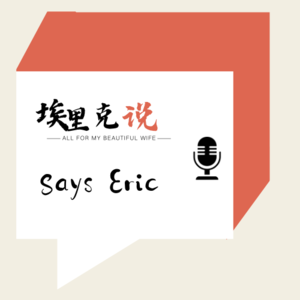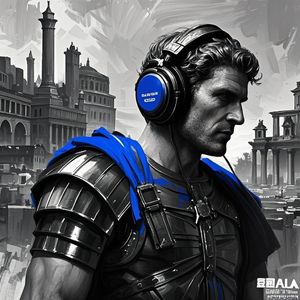

 Eric说书-银元时代生活史 - 陈存仁 EP.01
Eric说书-银元时代生活史 - 陈存仁 EP.01中医才子陈存仁:悬壶济世的文史传奇 陈存仁(1908—1990),名保康,一名承沅。原籍浙江平湖人,出生在上海一个破落的商人家庭,父亲是开绸布店的。还在陈存仁刚刚懂事的时候,父亲就因破产和多病辞世而去。他是由四伯父抚养长大的。 陈存仁共有兄弟三人,他排行老二。上海浦东小学毕业后考入南市民立中学,三年毕业,谨遵父亲遗命学医,
 碎碎念-跟一个滴滴司机聊了睡午觉和吃饭
碎碎念-跟一个滴滴司机聊了睡午觉和吃饭一个很懂生活的司机 知足常乐 给我提供了一丝淡定
 《我在北京送快递》读后感
《我在北京送快递》读后感《我在北京送快递》的书,是Eric在2024年看过的第一本书,作者是胡安焉,起初在酒店做服务生,学历不高(中专),但在文字写作、音乐、漫画等方面有涵养和素养。经历过多种工作,最引人注目的是在北京送快递。疫情期间,作者在无事可做的情况下分享自己以前的工作经历,包括送快递以及其他十几种工作,引起关注,后来被出版社看上成书。他观察力很强,通过描述人物使人忍俊不禁。写作真诚,受到麦田守望者和卡夫卡等书的影响。我一直喜欢非虚构作品,真实。最早别的播客也推荐了,有个观点是,社会基层的规则,软柿子被欺负是一种常见现象——这本书是了解社会的好窗口,特别推荐给大家阅读。
 考证了一个英文播客的来龙去脉
考证了一个英文播客的来龙去脉大名鼎鼎的The Knowledge Project,为什么邮件啥的都写着Farnam Street呢? 原来:Our name is a homage to the 巴菲特和芒格; the address of their business, Berkshire Hathaway, is 3555 Farnam Street. We call it FS for short now.
 碎碎念-忙完大事儿回来啦
碎碎念-忙完大事儿回来啦似乎总是匆忙 匆忙得来不及分享
 碎碎念-终于有了自己的声卡
碎碎念-终于有了自己的声卡是从百子湾一个出器材的大哥买的,当时本来想买无人机spark的遥控器,但是后来放弃了,决定手机遥控;但是买了个监视器,还有声卡啥的,打包好像500;声卡后来发现有问题,寄过去修来回120还买了根线,不过整体ok吧,现在能用了,高兴
 碎碎念 第一次玩剧本杀
碎碎念 第一次玩剧本杀本子有点太脱离生活啦,太文艺啦,其他还好,enjoy推理的过程
 随想021-早起真是爽 一直早起一直爽
随想021-早起真是爽 一直早起一直爽早起+睡前不吃东西,应该作为两个corner stone habits被竖立起来 最近因为连续 4 天早上 6 点半到7点之间起,连上了 3 个早班,再加上一个会,被迫早起;想起了 22 年闭环的时候,我和室友晚上一起锻炼,早上早起,连续触发多巴胺。 大家推崇早起不是没有原因的,科比、乔丹、乔布斯他们为什么都早起?正能量的循环
 随想020-黄角树下-看完《别了,温哥华 》-最终还是圆满结局
随想020-黄角树下-看完《别了,温哥华 》-最终还是圆满结局最终还是圆满结局 不容易 希望每一对真心相爱的couple都顺利渡过难关吧,这何尝不是一种修行?
 随想019-黄角树下-看《人生之路 》品创作初衷
随想019-黄角树下-看《人生之路 》品创作初衷不要 为了表达而表达 而要给人带来力量 景老师和高加林在山坡上的对话注定成为经典
 随想018-黄角树下-再看《别了,温哥华 》2-出国留学毕业找不到工作怎么办?
随想018-黄角树下-再看《别了,温哥华 》2-出国留学毕业找不到工作怎么办?实际上还是一个信息能力匹配的过程 可以说是一个传播学的过程?
 随想017-黄桷树下-从维珍集团创始人的发家之路回看我高中的创刊经历
随想017-黄桷树下-从维珍集团创始人的发家之路回看我高中的创刊经历 Eric生活琐记碎碎念016-怀旧剧场-再看《别了,温哥华 》
Eric生活琐记碎碎念016-怀旧剧场-再看《别了,温哥华 》《别了,温哥华》改编自华裔女作家常琳的小说《雪后多伦多》,是导演赵宝刚执导,陈坤、赵琳、李小冉、姜武主演的一部情感剧作。 本剧讲述了神秘而美丽的任晓雪与高干子弟罗毅在加拿大发生的一段爱情故事。 本剧于2004年2月14日在东方电视台新闻娱乐频道首播。
 Eric生活琐记碎碎念015-好久没打篮球了
Eric生活琐记碎碎念015-好久没打篮球了37岁打球 有37岁的收获
 【读书笔记】Peter Thiel《The Contrarian》01-硅谷大佬的一年级律师生活
【读书笔记】Peter Thiel《The Contrarian》01-硅谷大佬的一年级律师生活最近因为一个contrarian question想起了Peter Thiel,检索了一下,他居然有一本传记就叫“the contrarian” 于是就找来看(想要看这本书的朋友后台留言) 虽然以前就知道他在进入硅谷之前是做法律的,甚至做过知名法官的clerk,但是看完著作才对他早年的生活有更多的了解。现在刚看到他进入职场,成为了Corporate Lawer的生活,感觉这个描述很有意思: Federal law clerks don’t generally work as hard as ambitious law students or first-year corporate lawyers, so Thiel created a little extra intensity for himself. A fellow clerk told me that when he visited Thiel, there was a stack of books on his kitchen table. “He said he needed to round himself out,” this person said. “So he was rereading Ulysses.” Thiel’s experience in the real world, which started the following fall when he moved to New York to begin as a first-year associate at the elite corporate law firm Sullivan & Cromwell, was less glorious than the PC-free zone he’d fantasized about on campus. He’d imagined corporate law as a profession full of righteous anti-communist greed; in fact, it was a grind. Law, as practiced in the real world, had all the naked, humbling ambition of Stanford, but with none of that pleasant self-righteousness. There were no liberals to fight, just an endless supply of young men and women, spread out across a familiar selection of white-shoe firms, with the same nearperfect grades, the same near-perfect LSAT scores, the same willingness to work eighty hours a week, no matter how inane the task. He had no discernible edge; it was almost as if he didn’t matter. He told a friend that being a corporate lawyer made him feel like a cog, afunctionary, with no hope of having any impact on anything. To succeed—to make partner—was exciting in a sense, but that goal, too, felt empty of any real meaning. If he was being honest with himself, he was becoming depressed. “I thought that a lot of the conventional ways people competed resulted in too many people [doing] conventional things,” he would say years later. “Then you end up in very competitive dynamics, and then even when you win it’s not quite worth it. You might get a slightly better paying job than you otherwise would, but you sort of have to sell your soul. That doesn’t sound like a very good economic or moral tradeoff.”
 12
12 0
0